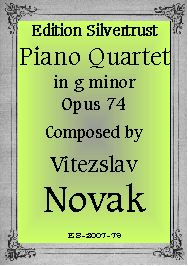Presents
Vitĕzslav Novák
Piano Quartet in c minor, Op.7
 It seemed unlikely that Vitĕzslav Novák
(1870-1949) would become a
musician having begun by hating music as a result of being brutally forced to
study the violin and the piano as a young child. But a fascination for
composition, which he discovered in his teens, led to his decision to enter the
Prague Conservatory, where he studied with Dvorak among others. Dvorak's example
of using Czech folk melody in his music to foster the nationalist cause at a
time when the Czech and Slovak peoples were seeking statehood from Austria
encouraged the young composer to follow this path. After graduating from the
Conservatory in 1896, he traveled to eastern Moravia and Slovakia where the
local folk melodies he found served as a source of inspiration for him. He
was to become a leading proponent of the Czech nationalism in music in the generation
after Dvorak and Smetana.
It seemed unlikely that Vitĕzslav Novák
(1870-1949) would become a
musician having begun by hating music as a result of being brutally forced to
study the violin and the piano as a young child. But a fascination for
composition, which he discovered in his teens, led to his decision to enter the
Prague Conservatory, where he studied with Dvorak among others. Dvorak's example
of using Czech folk melody in his music to foster the nationalist cause at a
time when the Czech and Slovak peoples were seeking statehood from Austria
encouraged the young composer to follow this path. After graduating from the
Conservatory in 1896, he traveled to eastern Moravia and Slovakia where the
local folk melodies he found served as a source of inspiration for him. He
was to become a leading proponent of the Czech nationalism in music in the generation
after Dvorak and Smetana.
The Op.7 Piano Quartet originally dates from 1894. However, despite the fact that it won a state prize with a stipendium upon its premiere, Novak was dissatisfied with it and reworked it extensively only finishing his revisions in 1899. In fact, only the middle movement remains from the original work. The opening Andante has a very melancholy quality to it. The opening theme stated by the piano recalls the mediaeval plainsong, Dies irae. The second theme, first heard in the cello, is gentler. The rest of the movement involves a struggle between the two themes with their different moods. The second movement, Scherzino, allgretto comodo, as noted, is the only part of the original quartet that survives. Charming, bright and cheerful, it removes the aura of gloom from the preceding movement. The finale, Allegro, is a rondo. After a very short high-spirted introduction, reference is made to the solemn opening theme of the first movement and signals a dramatic competition between dark drama and stirring affirmation.
This is an important work, sitting as it does, on the edge of modernism, but still rooted in the ground of romanticism. An obvious candidate for the concert hall, it presents no unusual technical difficulties for amateurs who will enjoy it.
Parts $34.95